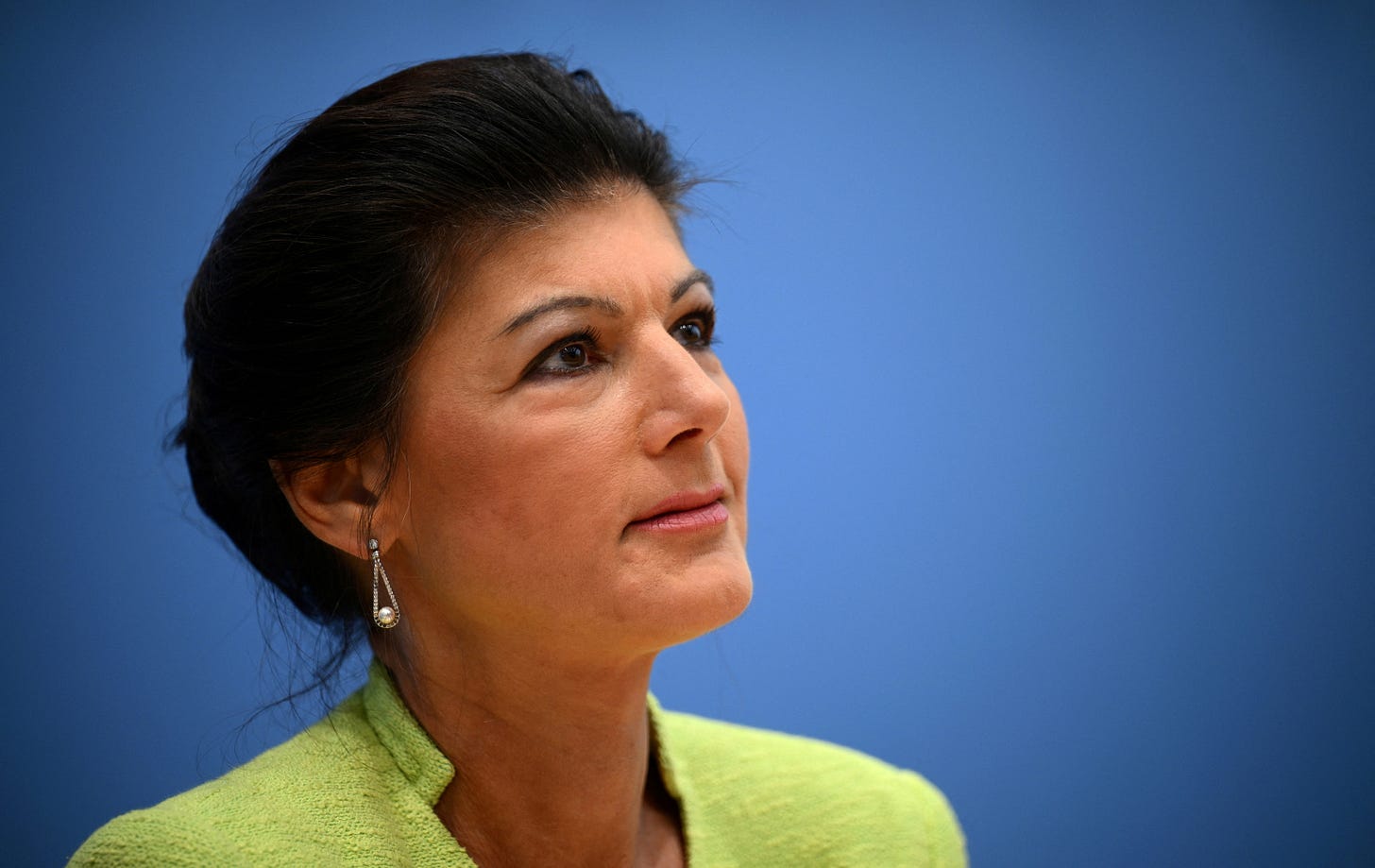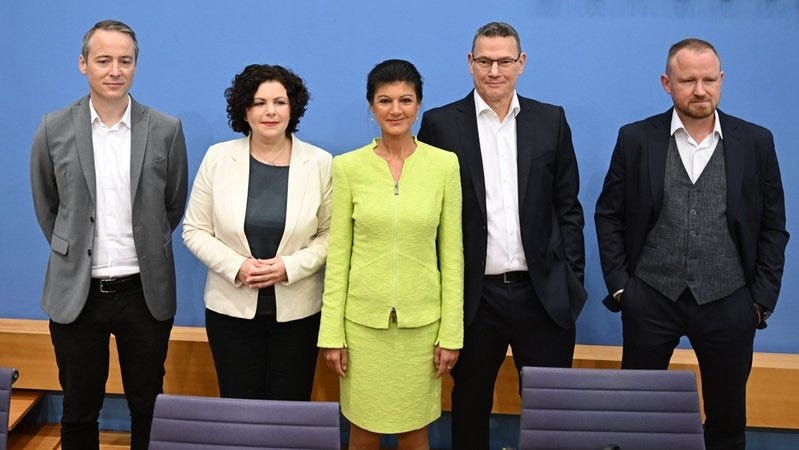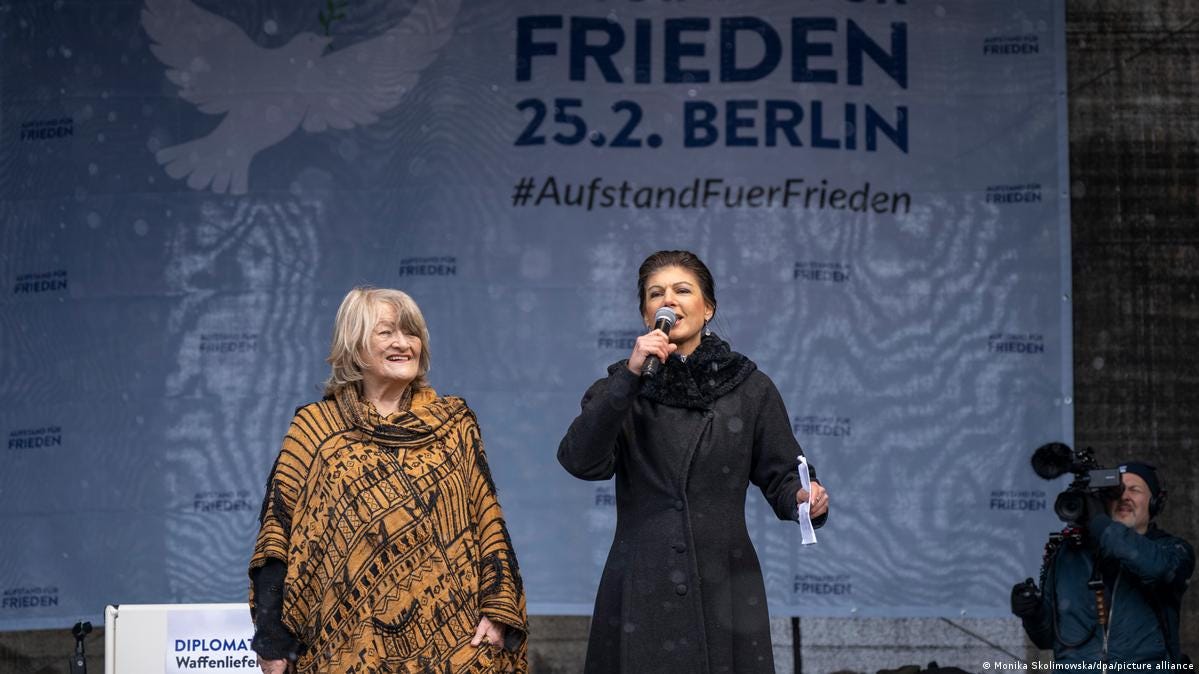Can Sahra Wagenknecht Revive The German Left's Fortunes?
Former leader of Die Linke, and one of Germany's most popular politicians, announced her intention to launch her own political party, vowing to give a "voice to the left behind".
Germany, once dominated by the so-called ‘volksparteis’ (people’s parties) and often considered a consensus-led country, has, in recent years, seen its political landscape fracture with the emergence of populist parties like the AfD. In 2021, due to the erosion of support for the two major establishment parties - the CDU and the SPD - the country saw the formation of its first three-way coalition government, consisting of the SPD, the Greens and the FDP, otherwise known as the ‘Traffic Light’ coalition, due to the parties respective colours.
On Monday, a significant new fissure opened, when one of the country’s most prominent leftist politicians, Sahra Wagenknecht, announced that she would form her own party, throwing up yet another wild card and challenging the political mainstream. Nine other parliamentarians joined her in leaving the Left, representing a death blow to her old party, which will lose not only its most recognizable member but also its status as a parliamentary group, which is linked to funding and media representation.
You would be hard-pressed to find a German who was not at least familiar with Wagenknect. A gifted orator, she has made something of a brand for herself with her scathing criticisms of the government’s immigration and energy policies. She is a frequent presence on television debate shows and at signings for her new best-selling book; on weekly YouTube clips, which are watched hundreds of thousands of times; and on the floor of the parliament, where she was a member of the Left party.
Now, however, she seems intent on capitalising on this popularity and translating it into an electoral vehicle for her views. Enter the ‘Bündnis Sahra Wagenknecht’, a new electoral programme that hopes to compete in next year’s EU elections and state elections in East Germany, where Ms. Wagenknecht has her roots and is especially popular.
Though currently vague on concrete policy prescriptions, broadly speaking, the group espouses to oppose globalism and the growing sectarianism of the broader German left, which they contend has led to its fall in public support in recent years. Other defined political positions include: further restrictions on immigration, a plan for deglobalization, opposition to green politics, ending military aid to Ukraine, and a negotiated settlement to the Russian invasion of Ukraine. Wagenknecht considers ‘BSW’ to stand primarily in opposition to The Left and Alliance 90/The Greens, groups she describes as representing "weird minorities" instead of "normal people". In contrast, Ms. Wagenknecht said her new party would be a home for those who feel abandoned by mainstream politics, and stand for “reason and fairness.”
At a time of great economic uncertainty and falling living standards, the liberal centre is vulnerable. State elections in Hesse and Bavaria this month saw all three parties in the federal ruling coalition — Social Democrats, Greens and Free Democrats — lose ground. The coalition, which until recently seemed to represent the aspirations of a more global, environmentally conscious Germany, is reeling. And Wagenknect clearly hopes to exploit that fall in support.
Ms. Wagenknecht blames the laziness of professional politicians for Germany’s economic malaise. “It is easier to regulate speech,” she once said, “than to raise the minimum wage.” She often talks as if there are really two lefts: a wage-raising left that wants to distribute wealth fairly (otherwise known as the economic-orientated Left) and a speech-regulating left that prefers to affirm gender identity and concern itself primarily with Identity Politics (otherwise known as the cultural-orientated Left).
By distancing herself from the latter, Wagenknecht joins a growing renaissance of the conservative tradition of left-wing ideology. Robert Fico, leader of the conservative left-wing SMER party, won Slovakia’s elections earlier this year, running on a similar anti-immigration, anti-Ukraine message that resonated with disaffected voters. Mette Frederiksen, the current prime minister of Denmark, dominates her country’s politics by combining left-wing positions on economics with right-wing views on immigration and crime. And other social democratic parties across the continent are fusing the two wings of thought to varying degrees of success.
It’s not just Die Linke, her former party, that she hopes to threaten with this new movement, however. Wagenknect wants to compete for the disaffected voters who have flocked to the country’s leading populist party on the far right, the Alternative for Germany, or AfD, which is now polling at around 20-22 percent support in most polls. By positioning herself on the right side of the political spectrum on issues like immigration and so-called ‘climate alarmism’, while maintaining a steadfast left-wing economic outlook, Wagenknect may be able to win over large swathes of the East-German voting populace, who often believe in the strengthening of the welfare state but favour more nativist policies on issues like immigration and national pride.
And it already seems to be working. A recent poll commissioned by BILD found that 27% of Germans would consider voting for the BSW. Another poll showed the new party taking 12% of the vote share when placed alongside other mainstream parties, eclipsing both Die Linke and the FDP, and coming neck-and-neck with the Greens, who were on 12.5%.
The creation of the party couldn’t have come at a better time. Next year, Germans will head to the polls in two rounds of elections that may alter the electoral landscape for the foreseeable future. First, in spring 2024, the much anticipated European elections will decide the composition of the European Parliament. As the largest country in Europe, Germany has the largest amount of seats - 96 - and thus has a significant impact on the formation of coalitions in Brussels. Usually considered inconsequential by most voters, the European elections offer a chance for voters to voice their displeasure with establishment forces, benefiting populist parties such as the AfD and, potentially, Wagenknecht’s BSW, depending on if the party has been established by that point. A huge win there may inject some much-needed momentum ahead of the next set of prominent elections - the East German state elections.
In September 2024, voters in Thuringia, Brandenburg and Saxony all head to the polls to elect representatives for their state parliaments. Buoyed by concerns over high immigration numbers and a political elite often viewed as indifferent to the concerns of East Germans, the AfD has exploited these anti-establishment sentiments, which has catapulted them into the lead in all three states. As a native of Thuringia, Wagenknecht is cherished in the former DDR and her style of populism may siphon voters away from the AfD, denying them a commanding lead and re-orientating the region back to the left.
But, in order to fully realise this dream, Wagenknect’s main priority will have to be on maintaining the BSW’s early momentum. Germany is no stranger to new, populist parties jumping onto the political stage and quickly fizzling out. The Pirate Party suffered a similar fate in the early 2010s, receiving large public support for its campaign around data protection, before plummeting over inter-party struggles and scandals involving senior members. To avoid this, a lot will depend on Wagenknect broadening her appeal and proving that the party is more than just a vanity project.




